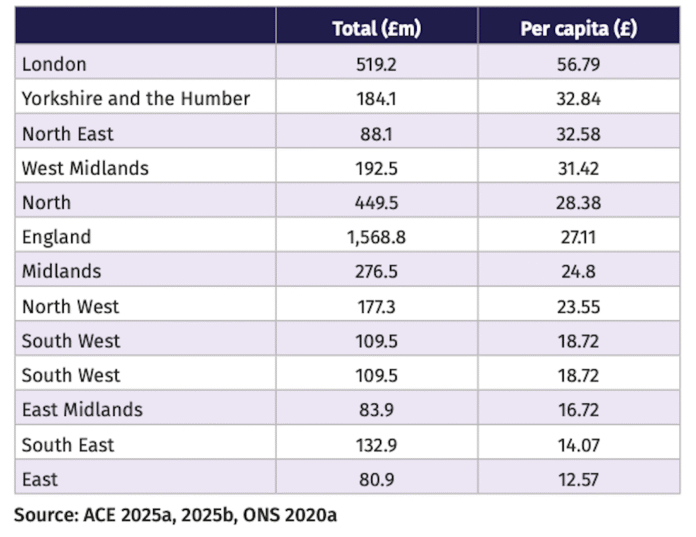The cultural funding “chasm” between regions remains “stark” despite a narrowing gap between London and the North of England, according to this year’s State of the North report.
Although the gap between National Portfolio Organisation (NPO) funding from Arts Council England (ACE) for London and the North has gone from £691m in 2017 to £411m this year, there is still “a clear need to go further on spreading cultural investment more fairly across the country”, the report found.
This would “redress historic underfunding and the challenges of cultural exclusion in regions like the North.”
The State of the North: The Kids Aren’t Alright report, conducted by the Manchester-based Institute for Public Policy Research North (IPPR North), focuses on the quality of life for young people in the North.
One of the factors it considers was access to opportunities, spaces and connections that enable them to lead “a good life”, which includes access to culture.
Despite the North’s “rich cultural heritage and dynamic range of cultural and creative industries”, the report stated that “at present, too few young people have the cultural access that they need to thrive or access to careers in creative sectors”.
It said: “Despite years of rhetoric on closing our regional divides, deep inequalities remain.
“There is an urgent need now to address this for the next generations of northerners to break out of the doom-loop of regional inequality which acts as a barrier to life chances and opportunity.”
‘Significant regional inequality’
In 2022, the government directed ACE to deliver more investment to arts institutions outside of London, recognising “inequalities in spending”.
The report noted that while “£24m was ultimately redistributed in the NPO budget, significant regional inequality still remains”.

According to IPPR North’s data, had the North received the same core funding per capita as London, it would have received nearly double the amount, rising from £383.5m to £794.6m.
When it comes to National Lottery Project Grants per capita, an equivalent allocation would have resulted in the North being awarded £39.1m more, leading to an uplift from £66m to £105.1m.
The report concludes that the North-South funding gap still needs to be addressed, and the disparity should be reflected in ACE’s next investment programme after 2026.
It also called for the government to commit to devolving ACE funding and responsibilities, so that investment can reach “local cultural priorities and areas of growth”.
An ACE spokesperson told Arts Professional: “The public, and crucially children and young people, deserve brilliant art and culture in their neighbourhoods and communities.
“Over the past decade, we’ve shifted our investment to help make that happen – closing the funding gap between London and the North by over £68m when comparing 2019/20 and 2023/24.”
They also said one of the strengths of the UK arts system was that “key funding decisions are taken by an arm’s length body able to take politically independent decisions and protect artistic freedom”.
‘Deep and persistent regional inequalities’
The report analysed arts education and access to creative subjects in the North, compared to other regions.
Between the 2011-12 and the 2023-24 school year, there was an 11% drop in the hours of art, drama or music taught in the UK, which the report said was particularly damaging for young people from disadvantaged backgrounds, many of whom “are often priced out of engaging with cultural events”.
Highlighting disparity between school library provision, the report found that 18% of primary schools in the North do not have a library, the highest percentage in the UK, compared with 6% in the South East.
Library closures were also found to have affected the North more severely, with over 18% of libraries closing since 2010.
In comparison, the English average sits at 10%, and the London average at 9%.
Government cuts have also led to the closure of youth services across the country, resulting in a 73% decrease in funding for such services between 2010-11 and 2023-24, representing a real-terms cut of £1.2bn.
Citing challenges including the recent cost-of-living crisis, and “narrowed horizons” as a result of the Brexit referendum, the report said that while these issues impact young people across the country, it is particularly the case in the North, “where young people are often further disadvantaged by our country’s deep and persistent regional inequalities”.
Patrick Fox, chief executive of Merseyside-based community arts organisation Heart of Glass, said it is “hard to view ACE funding in isolation” as there are wider issues that disproportionately affect the North, including “challenges to local authority funding, wealth gaps, collapse of private sector funding and rising interest rates”.
He continued, “ACE has done significant work in this area, but I think the energy for me should be around advocating for greater investment across arts and community funding nationally, and more connected investment in order to help address some of the significant social and political challenges we are facing.”







